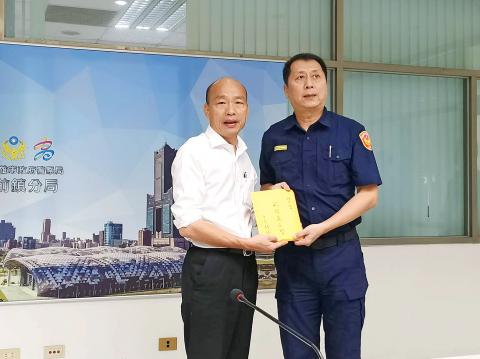Minister of the Interior Hsu Kuo-yung (徐國勇) yesterday visited Kaohsiung, the latest in a slew of top officials to visit the city in connection with a recent spate of violent incidents in the city.
Since a pet shop in Cianjhen District (前鎮) was vandalized on Tuesday, there have been intermittent street brawls near the store and a gun has been fired.
The incidents are reportedly linked to a dispute between two livestream hosts.

Photo: Huang Hsu-lei, Taipei Times
Twenty-five people have been detained, but no serious injuries were reported.
Earlier in the day, Kaohsiung Mayor Han Kuo-yu (韓國瑜) accused the Democratic Progressive Party government of politicizing crime ahead of next year’s presidential and legislative elections.
Han is the Chinese Nationalist Party’s (KMT) presidential candidate.
The city’s crime rate is down by 2 percentage points and its crime closure rate is up by 2 percentage points compared with the same period last year, Han said, adding that Kaohsiung has the third-highest closure rate among the nation’s six special municipalities.
“The government’s heavy-handed actions could hurt Kaohsiung’s image,” he said. “Who will take responsibility if the city loses investors or tourists?”
Hsu said that the spate of public disturbances left the central government with no option but to intervene.
“There have been brawls in Kaohsiung for three consecutive days, shots have been fired and police authority is under attack,” he said.
“We cannot allow … such incidents to spread... To that end, Criminal Investigation Bureau Commissioner [Huang Ming-chao (黃明昭)] and other officials have been dispatched to Kaohsiung” to hold a law enforcement conference, Hsu said.
Separately yesterday, President Tsai Ing-wen (蔡英文) said: “The Executive Yuan has acted appropriately by paying attention to law and order in the city and its actions are not motivated by any desire to interfere with Han.”

INVESTIGATION: The case is the latest instance of a DPP figure being implicated in an espionage network accused of allegedly leaking information to Chinese intelligence Democratic Progressive Party (DPP) member Ho Jen-chieh (何仁傑) was detained and held incommunicado yesterday on suspicion of spying for China during his tenure as assistant to then-minister of foreign affairs Joseph Wu (吳釗燮). The Taipei District Prosecutors’ Office said Ho was implicated during its investigation into alleged spying activities by former Presidential Office consultant Wu Shang-yu (吳尚雨). Prosecutors said there is reason to believe Ho breached the National Security Act (國家安全法) by leaking classified Ministry of Foreign Affairs information to Chinese intelligence. Following interrogation, prosecutors petitioned the Taipei District Court to detain Ho, citing concerns over potential collusion or tampering of evidence. The

‘FORM OF PROTEST’: The German Institute Taipei said it was ‘shocked’ to see Nazi symbolism used in connection with political aims as it condemned the incident Sung Chien-liang (宋建樑), who led efforts to recall Democratic Progressive Party (DPP) Legislator Lee Kun-cheng (李坤城), was released on bail of NT$80,000 yesterday amid an outcry over a Nazi armband he wore to questioning the night before. Sung arrived at the New Taipei City District Prosecutors’ Office for questioning in a recall petition forgery case on Tuesday night wearing a red armband bearing a swastika, carrying a copy of Adolf Hitler’s Mein Kampf and giving a Nazi salute. Sung left the building at 1:15am without the armband and apparently covering the book with a coat. This is a serious international scandal and Chinese

Seventy percent of middle and elementary schools now conduct English classes entirely in English, the Ministry of Education said, as it encourages schools nationwide to adopt this practice Minister of Education (MOE) Cheng Ying-yao (鄭英耀) is scheduled to present a report on the government’s bilingual education policy to the Legislative Yuan’s Education and Culture Committee today. The report would outline strategies aimed at expanding access to education, reducing regional disparities and improving talent cultivation. Implementation of bilingual education policies has varied across local governments, occasionally drawing public criticism. For example, some schools have required teachers of non-English subjects to pass English proficiency

TRADE: The premier pledged safeguards on ‘Made in Taiwan’ labeling, anti-dumping measures and stricter export controls to strengthen its position in trade talks Products labeled “made in Taiwan” must be genuinely made in Taiwan, Premier Cho Jung-tai (卓榮泰) said yesterday, vowing to enforce strict safeguards against “origin laundering” and initiate anti-dumping investigations to prevent China dumping its products in Taiwan. Cho made the remarks in a discussion session with representatives from industries in Kaohsiung. In response to the US government’s recent announcement of “reciprocal” tariffs on its trading partners, President William Lai (賴清德) and Cho last week began a series of consultations with industry leaders nationwide to gather feedback and address concerns. Taiwanese and US officials held a videoconference on Friday evening to discuss the